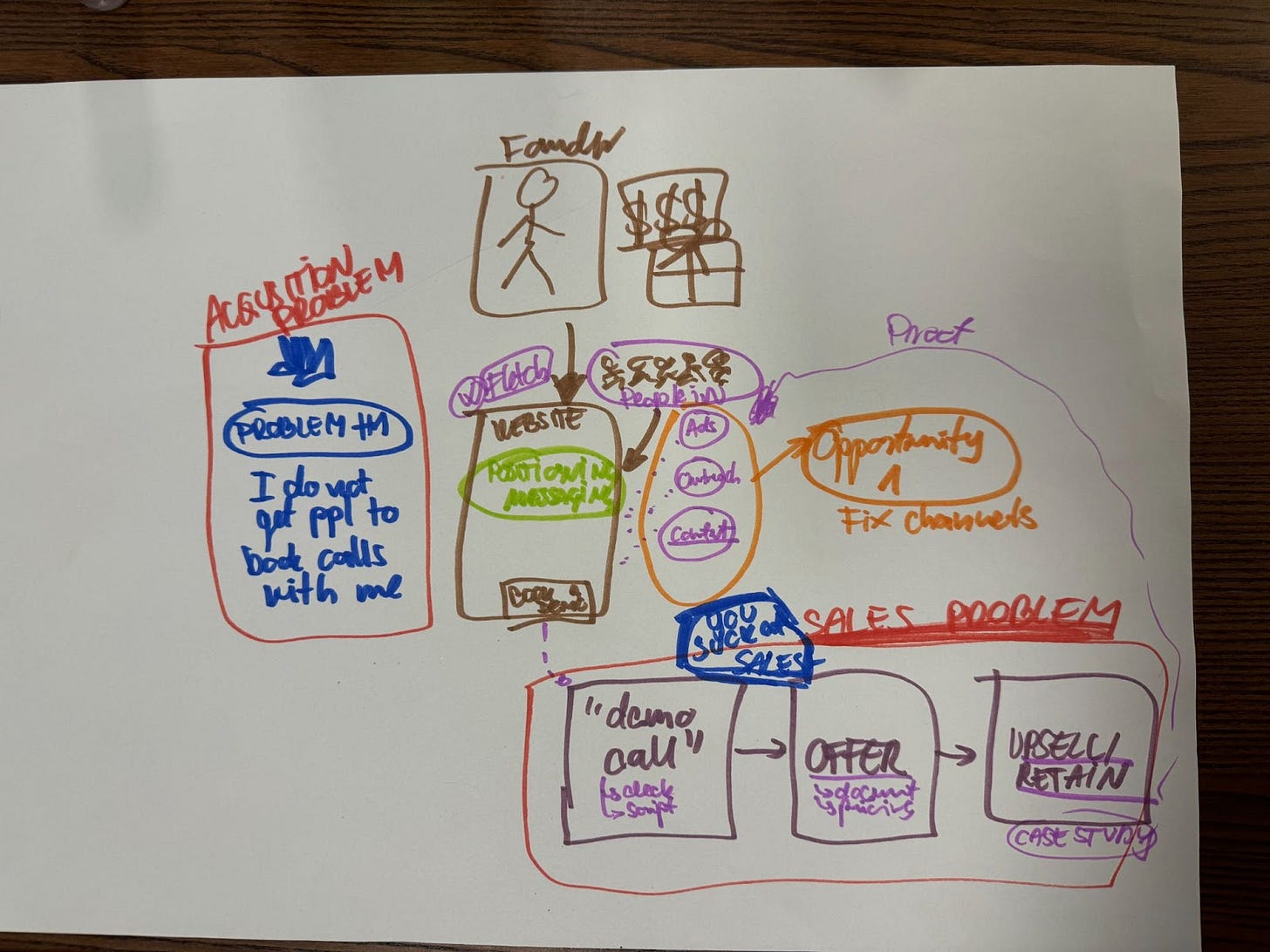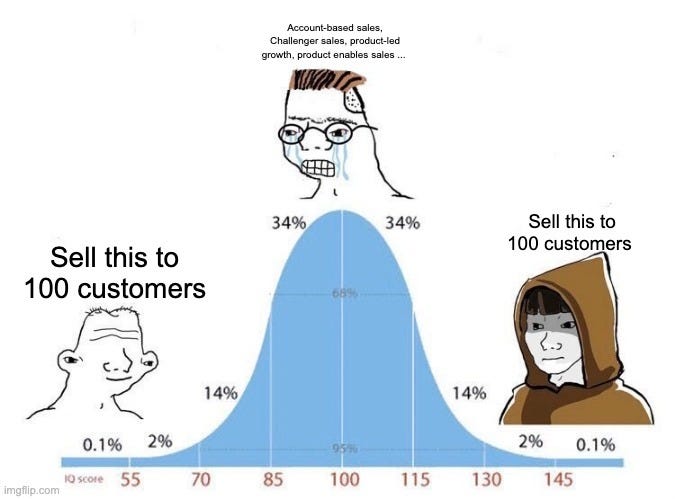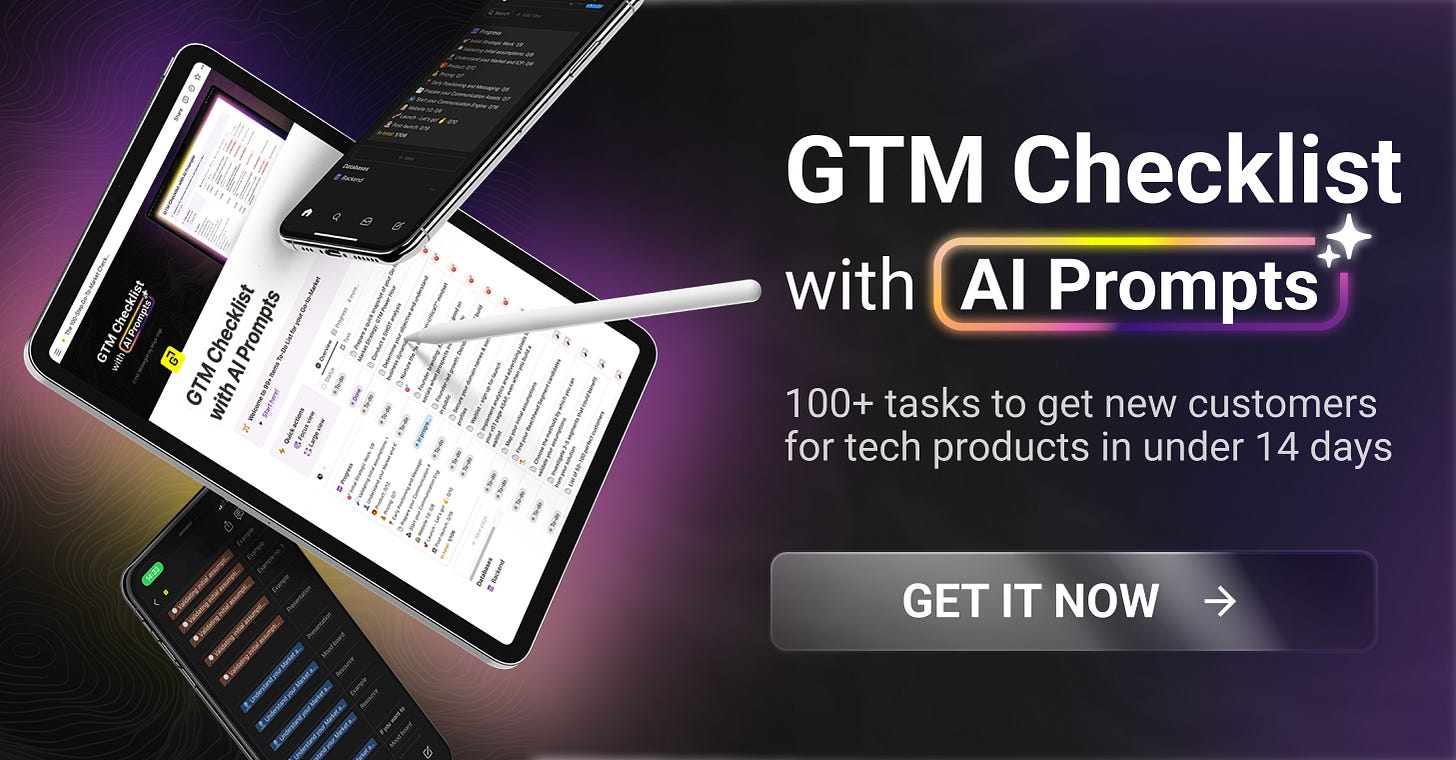Do You Have an Acquisition Problem or a Sales Problem?
Self-diagnosis tool, Sales Deck Template and 5 Examples inside
This post is my first ever post on sales. It aims to bring you the following insights:
A short diagnosis - Quiz: Should you first solve an Acquisition or a Sales problem?
3 lessons that everyone should know about sales
V01 of the founder-led sales process for go-to-market - how I DIY-ed my sales processes and added a feedback loop
Bonus: A sales deck template with 5 great examples
Experiment with me: In November, I will record all my sales calls with MeetRecord to get AI-based insights into what I can do better as a seller. Are you with me?
Dear GTM Strategist!
Never would I ever imagine that I could have a sales problem.
I was one of the wacko entrepreneurial kids.
My early ventures included:
Event management 🤡: Organizing puppet shows for the neighborhood (Pro tip: raffles during the breaks were a huge money maker)
Direct to consumer sales 💐: Dealing freshly picked flowers from my field to relatives
International ventures 🐚: Selling seashells at the promenade to tourists with other entrepreneurial kids from Eastern Europe. We did not speak the same language. We still made enough money for ice cream.
My life-long love for entrepreneurship made my relationship with sales very simple.
No sales = No business.
Yup, you have to do sales to do business. It is what it is.
I believed all I had to do was just follow the general wisdom of value exchange with customers:
Listen to the customer
Solve their problems
Teach, do not sell, aka challenger sales
But life taught me it is a little more complicated than that.
Sometimes, the market pulls you in unwanted directions and sends mixed signals…
Suppose strategy is all about prioritizing the limited resources to create the best results in a given situation and solving the right problem at the right time.
Yes, listen to the customer.
But make damn sure that it is your ICP and that you are not diverting too much from your product and business vision.
Focus is a friend, and FOMO is the enemy.
Before we go into the nitty gritty of sales, let’s diagnose if you even have a sales problem or is it better for you to continue working on your ICP, positioning and acquisition strategy to get more “input” for your sales process.
Quick Quiz: Do you have an acquisition or a sales problem?
The other day, I talked to Anthony Pierri, co-founder at Fletch, and expressed my frustrations with founder-led sales with this doodle:

In most simple words, I could describe this “OMG what am I looking at” image as:
You built something cool. Now you need customers.
You need people to visit your website and book a call/demo.
(That is the acquisition problem - you can do it yourself or outsource it, as long as it gets the job done.)Now you need to know how to make the “best out of the call” so you do not waste half of the meeting talking about “weather in the UK ☔” or nerd out about 51 features without letting the other party speak.
(Now, my friend, we are fixing the sales problem.)
Do not overthink this. I created a mini self-evaluation quiz (and Nail It and Scale It improved it - thanks!) to help you solve this dilemma. Rate each of the statements below based on your experience:
Answer "Yes" if the statement applies to you (0 points)
Answer "No" if the statement doesn't apply to you (2 points)
Statements:
1. I often feel that the market does not want what I sell. My traffic is <500 visits per month while competitors get much more traffic.
2. I have no predictable and scalable ways to get customers. >80% of my customers come from my existing network, networking events, and other non-scalable activities.
3. My scheduling link is wide open 🦗. I get <5 people booking meetings per month.
4. People do not show up for the calls/demos they booked. The skip rate is >33%.
5. It takes me forever to close deals (consistently over 6 months).
6. My closing rate from sales meetings is <30%.
7. I have to offer discounts on >33% of calls in order to close deals.
8. Prospects ghost me 👻 after we talk. This happens >30% of the time.
9. I have to fight for every single sale. <10% of prospects repeat purchase or refer others.
If you scored <14, you most likely have an acquisition problem. Also, check if your offer is off, if you are pitching to the wrong audience, and if positioning and messaging are clear and ICP centered.
But if you have seen that Go-to-Market components are already coming together nicely (score 14+), and the top of the funnel looks good, you can create a lot of impact in fixing the sales problem.
That was precisely my situation in September and October. For the first time in my life, I had a sales problem.
Want to go on this journey together? It is all about feedback loops 🔁
Join me on my mission to record and analyze sales calls. I listen to at least 5 sales calls a week and spend 8 hours analyzing them. This is how I learn to do better. I was doing this manually for myself and founders in my network whenever we felt we had a “sales problem”. We learned so much, but it was not scalable and I have some biases in self-analysis.
I am testing MeetRecord software that gives suggestions on improving your sales meetings and was super impressed that Alex Hormozi, the ultimate sales machine, uses it with his team. If it is good enough for him, it is good enough for me. After two weeks of testing it, here are my scores. I am trying to get better and better at this.
Record 600 minutes of your meetings and see where you can improve your selling skills to drive more conversions from your meeting, and let me know how it goes. My top score is 4 right now. Can you beat me to it?
Sales lessons for people who do not like sales (+ Sales Deck Template)
Look, I get it. Nearly no one went to business to do sales. It has a weird rep. There is fear of rejection, and many people in tech even feel intellectually superior to do sales. HUGE mistake. Sales is where you meet the customer in the tranches and learn a ton.
As a founder or a department lead, you will have to understand and participate in the sales process. At least in earlier, discovery stages, where you are still learning who the customer is, what would they like to buy and how would they like to buy it.
Here are three sales lessons I learned on my journey.
None of them is repulsive or ethically questionable.
Lesson #1: Leads that contact you want solutions NOW - not in a month.
In September, I was busy working on our products and forming new partnerships, and I did not manage to make many sales calls (maker mode) 🙈. Some opportunities died off - others I could restore. My unwillingness to take sales calls combined with my 7-day response time killed many opportunities. The longer you procrastinate with your response, the less likely it is that you are going to make a sale.

Lesson #2: There is a knowledge asymmetry between a seller and a buyer.
You have to lead the sales call. You must prepare an environment where customers feel comfortable and secure enough to buy. Preparation is crucial. You do not just come to a sales call to do a “demo of the 45 product features” or be there for Q&A session. You have to dive deep into the problem, understand the competitive alternatives (how else can they solve this problem), have ready relatable case studies, and be prepared to answer customers' questions.
In other words, you need a Sales Deck.

I recently read April Dunford’s best-selling book, The Sales Pitch. Based on her principles and best practices from my network, I created this free practical guide for how you can create or improve your sales deck (with examples and structure that you can follow). Hope you will love it.
Lesson number 3: Kiss the mental garbage goodbye 😘 - Sell.
If I could teach one superpower to my portfolio companies, sales would be it. So many smart people are self-sabotaging themselves when it comes to sales. Look, it is not rocket science and you can learn how to do it. People with much lower IQs than you are doing it well, and so can you. Stop overthinking it. You are definitely not “too good to do sales”.
I listen to many demos and sales calls from my teams. Fixing the sales process is one of the fastest ways to secure more revenue and growth for them.
These are common mistakes that I have observed in my business practice:
Jumping into a demo before even understanding if the client has this problem and how it manifests in their business
Read the sales scripts
Talk for more than 10 minutes without letting the other party talk
Sugarcoat the objections - if a client needs a feature, saying that it is in your “pipeline” will not be a good enough reason to buy
Avoid talking about the prices and offers
Sending the offers too late
Luring the deal with discounts when the client never asked for them
And so many more. I get it - sales are hard. Fear of rejection is a very paralyzing feeling and to my best knowledge, the only way to beat it includes shock therapy of confronting this fear. To just do sales.
Think about sales as this:
You know something is a good idea. Now you can help other people to improve their life by embracing this idea.
If you really think about this, you have been selling all your life:
You sold your parents the idea that you can do out on Fridays.
You sold your idea of how you can help their business to an employer.
You sold the idea of living together, getting married or create a family to your partner.
Now, let’s focus your natural sales talents on a mission to grow your business.
V01 Founder-led sales process: My November 2024 Sales Stack
Yes, I am still the one doing all my sales. Sometimes, I work with my business development partners for other geographies or niches, but 95% of the time, you will have a sales call with me. Why? Am I too cheap to hire proper salespeople?
No. I would love to scale my sales process, but not before I know that it can be scalable. There are jobs to be done (most likely by a founder) before you can bring big sales guns to the business:
Effective tech stack to capture and process the lead - as you know there is a need for speed in the sales process. You have to make yourself available. Tools, templates, and automation can help you complete this job effectively and efficiently. Make it easy for a customer to buy from you. I recently launched this landing Notion page for my 90-min Go-to-Market consultation. There is a demo, testimonials, it is easy to book and most importantly - it converts at 11%, which is great. Most people do not go to “15 min coffee chats” with strangers and have better things to do in life than watching random demos. Tell them what is in it for them and show evidence that you can deliver on this promise.
Qualification process - the last thing you want to do is to lose time on sales calls with someone who is not your ICP and cannot buy for you. You need to be super-focus and careful where you allocate your sales efforts when you are scarce on resources. Spraying and praying is not a good strategy. For that, you need a well-structured ICP. Here are the methods that can help you validate your ICP.
Standardized sales documents and processes - today, I shared the sales deck template with you, but I am also working on a Sales Script and Deal Room with my partners. I will keep on sharing these materials with you on Substack and LinkedIn.
Follow up, upsell, retargeting and referral sequences - When you make the first sale it is just the beginning of your relationship with a customer. An average customer acquisition cost for a B2B client is $700 (Dreamdata, 2024). You have to optimize for LTV (lifetime value) or similar retention metrics. Eventually, you will need to invest in expanding the sales process to new deals and building up the LTV of existing clients.
Even though my close rate is very high at the moment, as the company is growing, we need to structure the sales process much better and start building fundamentals from “founder-led growth” to a more scalable process. I do not want to use morbid comparisons like - what about if I get hit by a bus tomorrow - but you know what I mean.
Cool - hope you liked this one. Let me know in the comments. Sales are a new subject for us to talk about, but hey - we have covered so many Go-to-Market motions so far that it was above time to scratch the surface of “what happens next”.
Good luck closing & remember, you have been doing sales all your life.
Now buckle up and let’s transfer this knowledge to create growth in your business!
📘 New to GTM? Learn fundamentals. Get my best-selling GTM Strategist book that helped 9,500+ companies to go to market with confidence - frameworks and online course included.
✅ Need ready-to-use GTM assets and AI prompts? Get the 100-Step GTM Checklist with proven website templates, sales decks, landing pages, outbound sequences, LinkedIn post frameworks, email sequences, and 20+ workshops you can immediately run with your team.
🏅 Are you in charge of GTM and responsible for leading others? Grab the GTM Masterclass (6 hours of training, end-to-end GTM explained on examples, guided workshops) to get your team up and running in no time.
🤝 Want to work together? ⏩ Check out the options and let me know how we can join forces.









Hi Maja,
Fantastic article. As someone who has worked in growth for over a decade and run my own growth agency for 5 years, the question of whether someone has an acquisition problem or sales problem comes up a lot. Two thoughts I wanted to share:
#1 - I love your checklist, but I think it would be helpful to have clear, objective benchmarks for each item on your list. You do this for some points (e.g. "My closing rate from sales meetings is <30%") but don't do this for others (e.g. "People often do not show up for the calls/demos they booked"). From my experience working closely with startups, many founder's expectations are out of wack, so keeping things vague can lead to incorrect conclusions. For example, I found running paid ads for startups that at best, about 80% of people who filled out a form online would show up for the demo. I could see some founders over-index on the 20% who didn't show up if they didn't have some solid benchmarks.
#2 - Maybe it's a bit too in the weeds for this article, but do you think that acquisition and sales problems can be intertwined at times instead of either/or? For example, I've worked with clients on paid ads who whose targeting and messaging was off-base. It would sometimes allow them to still drive a lot of meetings (e.g. because the prospect thought the product was different than it actually was), but the mis-alignment would lead to poor sales calls and ghosting afterwards. It's easy to assume that the sales call was the issue when it was actually a top of funnel problem instead.